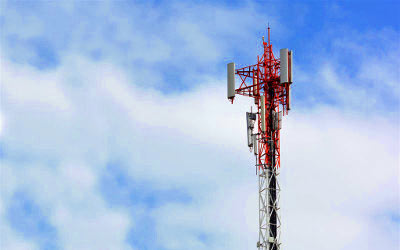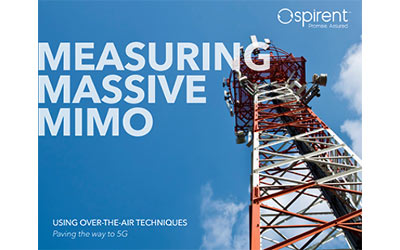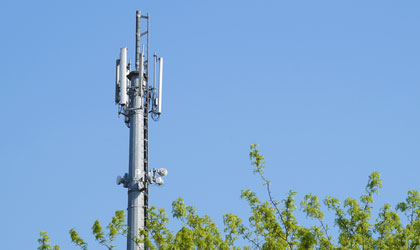The Spirent Vertex® Channel Emulator is a versatile platform that offers unprecedented scalability while supporting emulation of many channel models. The simple plug-and-play design is built to test a broad number of applications that require varying channel densities. Supported applications range from basic two-channel SISO to complex, high-density scenarios needed to prepare for 5G, such as 3- and 4-component carrier aggregation, higher order MIMO OTA, and 3D bidirectional beamforming.
With the ubiquitous promise of 5G networks, engineers from a wide range of industries are developing wirelessly connected products. They need the ability to test and verify their designs via user-friendly tools that reduce testing complexities and help them get to market faster, with lower cost and peak performance. Watch this webinar to learn about the intricacies of real-world 5G environments and how 3D channel modeling software can simplify the creation of complex antenna propagation scenarios in a lab setting.

Spirent’s Advanced Channel Modeling software allows simple creation of highly complicated propagation scenarios such as massive MIMO and high-speed vehicle. Simply select from an intuitive menu of parameters, or import any or all of them, and then build the desired environment in a few clicks.
5G standards are influencing not only new cellular networks, but the Wi-Fi networks that must interwork with them. In this webinar, Spirent discusses the many enhancements to both technologies and the challenges ahead in implementation and ensuring comprehensive testing for superior performance.


Test the MIMO performance of your device in a realistic Over-the-Air environment, either with an anechoic or reverb chamber

Integrate multiple Vertex instruments to support higher numbers of independent RF channels with real-time fading

Supports up to 16×16 independent channel models, providing the capability to test a mesh network with up to sixteen nodes
Emulate up to sixteen SISO or eight 2×2 MIMO cells to accurately reproduce real network conditions in the lab
Supports up to four 2×2 bi-directional carriers; each radio link can be modelled independently, simulating channel conditions to represent multiple carriers on the same or different eNodeBs
Enables the most accurate and consistent emulation of a variety of spatial channels and models

The approach to testing the connectivity and functionality of 5G networks is as revolutionary as the network itself. This eBook gives a quick overview of what’s coming in 5G and details an innovative approach to testing the massive MIMO antenna arrays that will be an integral part of the new technology.
With the ability to teste from the core network to the Wi-Fi offload, gateways now extend to the access points, Spirent Landslide ensures that mobile operators can deliver reliable and seamless services to subscribers under fully loaded conditions. Mobile operators and equipment vendors can validate subscriber experience as they move between nationwide mobile networks, carrier Wi-Fi hot-spots and private wireless networks.


Spirent has partnered with Topyoung to develop an innovative test solution that provides an economic and practical way to test the performance of massive MIMO and 3D beamforming systems in a lab environment.
Spirent Vertex addresses testing of critical and highly complex RF communication channels and specialized military scenarios. Features include frequency bandwidths as low as 30MHz, mesh network configurations, and wideband frequency hopping.


Basic RF testing
(2G/3G)

MIMO beamforming
carrier aggregation
MIMO OTA
(3G/4G)

Advanced MIMO OTA
Multi-user/Multi-carrier
Massive MIMO
(4G/4.5G ⇒ 5G)

Spirent’s Vertex MIMO OTA solution models real-world over the air environments and can be used with both anechoic and reverberation chambers. For anechoic chambers, Vertex supports up to 32 RF probes and two carriers with 16 dual polarized probes or 8 dual polarized probes on one instrument. For reverberation chambers, up to four carriers can be aggregated on one instrument.
Capturing, saving and playing back an RF environment is easier than ever with Spirent’s Live2Lab Virtual Drive Test – Conversion Tool (VDT-CT). Drive a route once, capture RF scenarios with a third-party scanner, and play them back with Live2Lab for repeatable, realistic drive testing within minutes. For high-speed train or aircraft device performance scenarios, Spirent’s Live2Lab can import and analyze logged data at speeds up to 1,620 km/hr (1,007 mph).

Scalability
The Vertex Wireless Channel Emulator is scalable to a broad range of applications. The hardware is capable of supporting as few as two bidirectional RF channels for basic RF testing and as many as 32 unidirectional RF channels to support high channel density applications in one instrument.
Modularity
Separate RF modules are optimized for unidirectional or bi-directional applications and support a variety of different frequency bands; which allows Vertex to be configured for specific test needs using minimal hardware.
Wide frequency range and bandwidth
Vertex has an unmatched frequency range of 30MHz to 5925MHz with a single instrument. Individual bandwidths can be as high as 200MHz per channel and be combined up to 1GHz with concatenation to support frequency hopping.
High channel density in a compact space
Remote programming interface (RPI)
Comprehensive 2D/3D channel modeling
Vertex overview capabilities, and applications
Download ↴